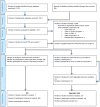Which patients benefit from adding short-term psychodynamic psychotherapy to antidepressants in the treatment of depression? A systematic review and meta-analysis of individual participant data
- PMID: 36404677
- PMCID: PMC10520584
- DOI: 10.1017/S0033291722003270
Which patients benefit from adding short-term psychodynamic psychotherapy to antidepressants in the treatment of depression? A systematic review and meta-analysis of individual participant data
Abstract
Background: Adding short-term psychodynamic psychotherapy (STPP) to antidepressants increases treatment efficacy, but it is unclear which patients benefit specifically. This study examined efficacy moderators of combined treatment (STPP + antidepressants) v. antidepressants for adults with depression.
Methods: For this systematic review and meta-analysis (PROSPERO registration number: CRD42017056029), we searched PubMed, PsycINFO, Embase.com, and the Cochrane Library from inception to 1 January 2022. We included randomized clinical trials comparing combined treatment (antidepressants + individual outpatient STPP) v. antidepressants in the acute-phase treatment of depression in adults. Individual participant data were requested and analyzed combinedly using mixed-effects models (adding Cochrane risk of bias items as covariates) and an exploratory machine learning technique. The primary outcome was post-treatment depression symptom level.
Results: Data were obtained for all seven trials identified (100%, n = 482, combined: n = 238, antidepressants: n = 244). Adding STPP to antidepressants was more efficacious for patients with high rather than low baseline depression levels [B = -0.49, 95% confidence interval (CI) -0.61 to -0.37, p < 0.0001] and for patients with a depressive episode duration of >2 years rather than <1 year (B = -0.68, 95% CI -1.31 to -0.05, p = 0.03) and than 1-2 years (B = -0.86, 95% CI -1.66 to -0.06, p = 0.04). Heterogeneity was low. Effects were replicated in analyses controlling for risk of bias.
Conclusions: To our knowledge, this is the first study that examines moderators across trials assessing the addition of STPP to antidepressants. These findings need validation but suggest that depression severity and episode duration are factors to consider when adding STPP to antidepressants and might contribute to personalizing treatment selection for depression.
Keywords: Combined treatment; depression; individual participant data meta-analysis; moderator; short-term psychodynamic psychotherapy (STPP).
Conflict of interest statement
ED reports grants from the Dutch Psychoanalytic Funds and Netherlands Organisation of Scientific Research (NWO) during the conduct of the study. MF, JJMD, JP, HLV, GM, GR, SR, FC, VGV, AA, YB, JLR, VVS, JWRT, FJW, and PC have no conflicts of interest to declare.
Figures
Similar articles
-
The efficacy of adding short-term psychodynamic psychotherapy to antidepressants in the treatment of depression: A systematic review and meta-analysis of individual participant data.Clin Psychol Rev. 2020 Aug;80:101886. doi: 10.1016/j.cpr.2020.101886. Epub 2020 Jun 26. Clin Psychol Rev. 2020. PMID: 32650213
-
Efficacy and moderators of short-term psychodynamic psychotherapy for depression: A systematic review and meta-analysis of individual participant data.Clin Psychol Rev. 2023 Apr;101:102269. doi: 10.1016/j.cpr.2023.102269. Epub 2023 Mar 16. Clin Psychol Rev. 2023. PMID: 36958077
-
Which patients benefit specifically from short-term psychodynamic psychotherapy (STPP) for depression? Study protocol of a systematic review and meta-analysis of individual participant data.BMJ Open. 2018 Feb 20;8(2):e018900. doi: 10.1136/bmjopen-2017-018900. BMJ Open. 2018. PMID: 29463590 Free PMC article.
-
Efficacy and suitability of adding short-term psychodynamic psychotherapy (STPP) to pharmacotherapy in patients with depressive disorders: a systematic review.Trends Psychiatry Psychother. 2025;47:e20230764. doi: 10.47626/2237-6089-2023-0764. Epub 2024 Apr 30. Trends Psychiatry Psychother. 2025. PMID: 38687843
-
The efficacy of short-term psychodynamic psychotherapy for depression: A meta-analysis update.Clin Psychol Rev. 2015 Dec;42:1-15. doi: 10.1016/j.cpr.2015.07.004. Epub 2015 Aug 1. Clin Psychol Rev. 2015. PMID: 26281018 Review.
Cited by
-
Developing an individualized treatment rule for Veterans with major depressive disorder using electronic health records.Mol Psychiatry. 2024 Aug;29(8):2335-2345. doi: 10.1038/s41380-024-02500-0. Epub 2024 Mar 14. Mol Psychiatry. 2024. PMID: 38486050 Free PMC article.
-
Predicting heterogeneous treatment effects of an Internet-based depression intervention for patients with chronic back pain: Secondary analysis of two randomized controlled trials.Internet Interv. 2023 Jun 7;33:100634. doi: 10.1016/j.invent.2023.100634. eCollection 2023 Sep. Internet Interv. 2023. PMID: 37635949 Free PMC article.
-
Developing a multivariable prediction model to support personalized selection among five major empirically-supported treatments for adult depression. Study protocol of a systematic review and individual participant data network meta-analysis.PLoS One. 2025 Apr 23;20(4):e0322124. doi: 10.1371/journal.pone.0322124. eCollection 2025. PLoS One. 2025. PMID: 40267025 Free PMC article.
References
-
- Andreoli, A. (1999). What we have learned about emergency psychiatry and the acute treatment of mental disorders. In De Clercq M., Andreoli A., Lamarre S., & Foster P. (Eds.), Emergency psychiatry in a changing world (pp. 13–22). Amsterdam: Elsevier. 10.1016/j.genhosppsych.2003.11.006. - DOI
-
- Bellak, L. (1993). Manual de psicoterapia breve, intensiva y de urgencia [Manual of brief, intensive and emergency psychotherapy]. Manual Moderno.
-
- Bellak, L. (1994). Manual para la Evaluación de las Funciones del Yo [Manual for the Assessment of Ego Functions]. Manual Moderno.
Publication types
MeSH terms
Substances
LinkOut - more resources
Full Text Sources


